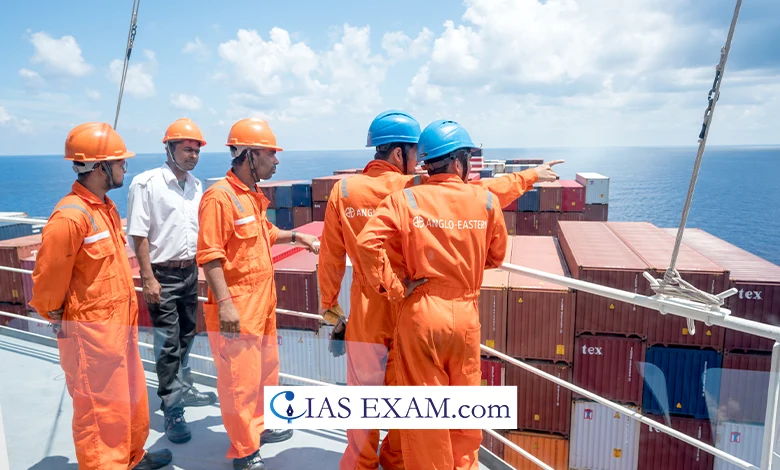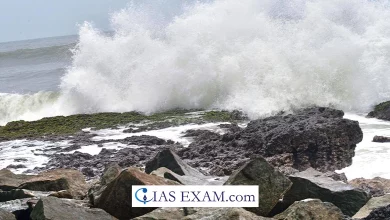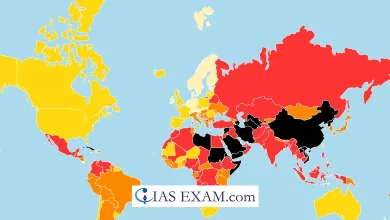Daily Current Affairs for UPSC
Safety and Security of Indian seafarers
Syllabus- Geography [GS Paper-1]

Context
The safety and security of Indian seafarers have become increasingly concerning because of recent attacks on commercial ships in sensitive areas.
Key Highlights
- India has proactively addressed those issues by submitting 3 papers to the International Maritime Organisation’s Legal Committee, emphasising the need for comprehensive maritime security and progressing contractual conditions for seafarers.
- While acknowledging the IMO’s efforts to fight maritime fraud, India has called for broader international cooperation to address numerous maritime threats.
Maritime Security Challenges
- Resurgence of Piracy and Armed Robbery
-
-
- Recent incidents off the coast of Somalia, which includes hijackings of vessels like the MV Ruen and MV Lila Norfolk, imply a resurgence of piracy.
- These acts pose considerable threats to the safety and security of seafarers and disrupt maritime trade routes.
-
- Extremist Attacks and Regional Conflicts
-
-
- The maritime domain has become increasingly susceptible to extremist attacks and regional conflicts, posing grave risks to seafarers and maritime security.
- With geopolitical tensions rising in sensitive areas such as the Red Sea and the Strait of Hormuz, the safety of commercial vessels and seafarers navigating via these regions is of paramount concern.
-
- Unlawful Recruitment Practices
-
- The exploitation of seafarers by illegal recruitment practices exacerbates maritime security challenges and jeopardises the well-being of seafarers.
- India highlights the effect of such practices on seafarers’ rights and stresses the want for global coordination to address those issues.
- Over 200 instances of seafarer exploitation have been mentioned to the Indian Maritime Administration since 2020, underscoring the urgency of addressing this issue to shield the rights and safety of seafarers globally.
The Vulnerabilities of Indian Seafarers
- Vulnerability to Incidents
-
-
- India, with 9.35% of world seafarers and ranking third globally, confronts such incidents.
- Indian seafarers face full-size vulnerabilities due to incidents together with vessel seizures and detentions, as exemplified through the cases of MSC Aries and MT Heroic Idun.
- These incidents no longer most effectively endanger the safety of seafarers but additionally disrupt their livelihoods and cause misery to their households.
-
- Lack of Legal Representation and Awareness
-
-
- A survey found that most Indian seafarers lack criminal illustration and are blind to their rights.
- This leaves them liable to exploitation and unfair treatment, as they may not be prepared to navigate complex criminal methods or assert their rights correctly.
-
- Unfair Treatment and Exploitation
-
-
- Many Indian seafarers document feeling unfairly handled and exploited, specifically in cases of unlawful recruitment practices and settlement violations.
- This now not handiest impacts their physical and psychological well-being but also erodes agreement in the maritime industry and undermines their self belief of their careers at sea.
-
- Disruption to Employment and Livelihoods
-
-
- Incidents which include vessel seizures and detentions can cause extended disruptions to seafarers’ employment and livelihoods, inflicting economic hardship and uncertainty for them and their households.
- These disruptions may have long-time period results for seafarers’ careers and general well-being.
-
- Psychological Impact
-
- The regular danger of piracy, armed theft, and other maritime safety challenges may have a profound mental effect on seafarers, leading to extended stress, anxiety, and trauma.
- Three years in the past, the Maritime Union of India highlighted a 40% increase in kidnappings inside the Gulf of Guinea, with 134 cases of assault, harm, and threats stated.
- Incidents such as the abduction of 20 Indian nationals from the MT Duke (off the western coast of Africa) and the ship proprietors paying hefty ransoms highlight the dangers confronted by seafarers.
Indian Initiatives to Protect Seafarers’ Rights: ‘Human Rights at Sea’ Initiative
- In response to the challenges faced by Indian seafarers, the Indian government and the National Human Rights Commission (NHRC) released the ‘Human Rights at Sea’ initiative.
- This initiative aims to raise recognition of human rights troubles within the maritime industry and suggest the security of seafarers’ rights.
- By highlighting cases of abuse, exploitation, and unlawful detention, the initiative seeks to maintain ship proprietors and different stakeholders accountable for violations towards seafarers.
- The initiative includes documenting cases of seafarer abuse, exploitation, and illegal detention to provide proof of human rights violations inside the maritime industry.
- The initiative advocates for the establishment of mechanisms to protect seafarers’ rights, including grievance mechanisms, legal aid services, and whistleblower security programs.
Way Ahead
- Comprehensive Approach to Address Piracy
-
-
- Addressing piracy calls for a multifaceted and comprehensive approach that encompasses both land-based and maritime strategies.
- While maritime safety features which include deploying private guards on merchant navy ships can help deter piracy to some extent, addressing the root causes and underlying conditions that enable piracy is essential for long-term effectiveness.
- Regional cooperation and records sharing mechanisms, such as joint patrols, intelligence sharing, and coordinated responses to pirate assaults, are essential for reinforcing maritime security and deterring piracy in piracy-inclined regions.
-
- Government Support
-
-
- Indian seafarers require strong government help to ensure their security, security, and well-being at sea.
- This help can also consist of diplomatic efforts to cope with piracy and maritime safety threats via international cooperation and engagement with relevant stakeholders.
- Governments also can provide assistance and assets for projects geared toward protecting seafarers’ rights, enhancing maritime security, and promoting safe navigation.
-
- Enhanced security Measures
-
- The maritime industry and related authorities need to implement more suitable security measures to protect Indian seafarers from security threats, exploitation, and unfair treatment.
- This can also involve strengthening safety protocols, improving contractual situations, imparting criminal representation and aid offerings, and raising focus of seafarers’ rights and responsibilities.
- Companies and employers should additionally prioritise the security and well-being of their seafaring personnel by investing in training, system, and hazard mitigation techniques.
Source: The Hindu
UPSC Mains Practice Question
Q.What are the recent challenges faced by the Indian seafarer? Highlight the steps that can be taken to address certain issues. (250 words)





.png)



